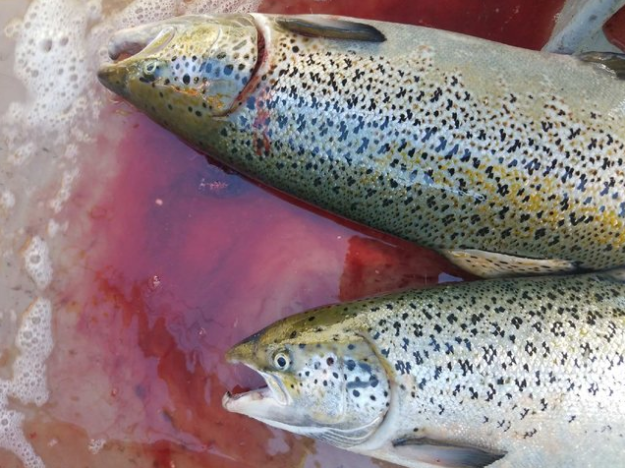Photo Seattle Times
Anglers and commercial salmon fishers off the coast of Washington and Vancouver have known for years that the occasional escapee Altantic salmon from off-shore aquaculture nets is swimming wild in Pacific waters. Atlantic salmon have turned up in nets, and juvenile Atlantic salmon were reported off of Vancouver Island as early as 2000, indicating that some of the invasive fish have migrated and spawned. But never before have so many pen-raised Atlantic salmon escaped into the wild as happened Monday, when more than 300,000 farm-raised Atlantic salmon ended up swimming free as their nets collapses thanks to the high tides that coincided with the solar eclipse.
The “spill” of salmon into Pacific waters carries with it worries of disease, competition with native Pacific salmon—populations are in peril this year thanks to a cocktail of difficult ocean conditions and upstream spawning success in recent years—and the chance that these farm-raised, pellet-fed fish will attempt to spawn in Northwest waters. Lummi tribal fisherman were incensed at the escape, which happened at a Cooke Aquaculture net pen off of Cypress Island. The response from officials has been quick—anglers are encouraged to catch as many Atlantic salmon as possible. There is no limit, and customers can legally buy Atlantic salmon from tribal and commercial fisherman.
While Northwest fishermen are dealing with this crisis, fisheries managers in Ireland are reporting more and more Pacific pink salmon in Irish waters. According to the Irish Times, 30 pink salmon have been captured at a weir on the Galway River. According to Inland Fisheries Ireland, pinks are having a big year in the north Atlantic, returning to spawn in waters of Iceland, Scotland and Norway. These fish are believed to be the progeny of a Russian stocking effort from the 1960s and 1970s. The concerns of Irish fishermen mirror those in the Northwest—while there’s virtually no chance the fish will hybridize due to simple genetics and the fact that the two species spawn at different times, there is concern over competition for available rearing habitat and food sources for maturing fish.
As worries over exotic fish migrating up freshwater rivers and streams occur throughout the hemisphere, the need to protect those spawning streams, and thousands of other small headwater streams vital to trout and salmon has never been more acute. Today, beer brewers are joining with conservation groups like Trout Unlimited and heading to the Denver headquarters of the Environmental Protection Agency to protest the proposed repeal of the Clean Water Rule that protects small headwater streams from irresponsible and unnecessary development.
It’s clear that anglers and others who value clean water have jumped into the fray and made their voices heard during the EPA’s initial comment period (it was 30 days, but has been extended until Sept. 27). EPA Administrator Scott Pruitt appeared in an agri-business video encouraging the agriculture industry to comment on the proposed repeal of the rule, and conservation groups, like TU have asked anglers and conservationists to do the same, with the hopes that keeping intact these small headwater streams will ensure good spawning and rearing habitat for trout and salmon, provide thermal relief for coldwater fish during hot summer months, and keep the sources of our great rivers clean for all who live downstream.
— Chris Hunt



